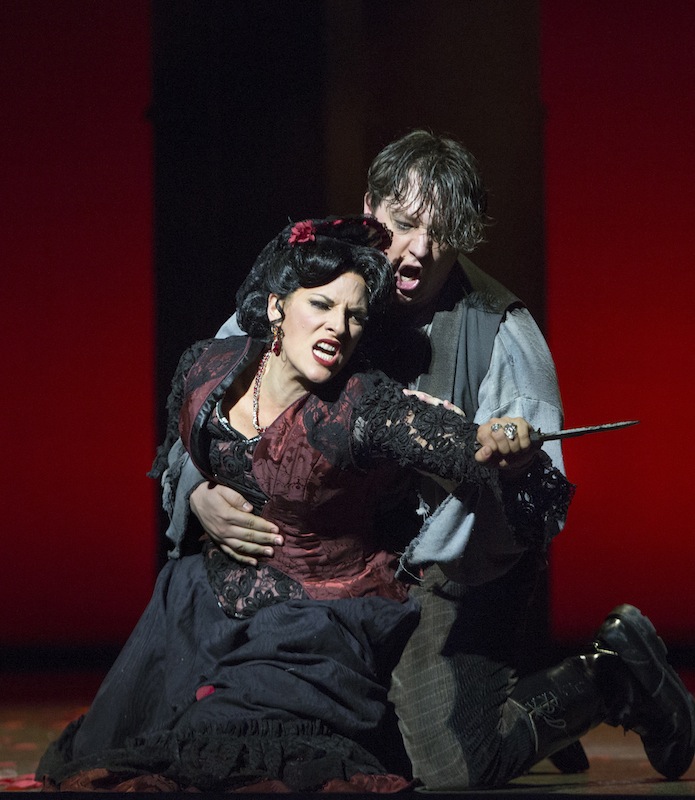Babcock’s seductive performance heats up Fort Worth Opera’s “Carmen”

Audrey Babcock and Robert Watson star in Bizet’s “Carmen” at Fort Worth Opera. Photo: Marty Sohl
One of the joys of life-long opera viewing is the occasional discovery of a singer who can completely fulfill that most complex, rewarding, and demanding of roles, Carmen.
Fort Worth Opera put such a singer onstage Saturday night at Bass Performance Hall when Audrey Babcock appeared as the ill-fated gypsy in Bizet’s dramatic masterpiece Saturday night.
Obviously, command of the technical aspects are the essential element of Carmen (or any other operatic role, for that matter); Babcock brings a richly textured, flexible voice with a distinctive and immediately recognizable tone quality. And she proved equally attuned to the emotional and psychological elements. In comments published in the program book, she refers to the “confrontation with sexuality” that is at the heart of Carmen; with an almost acrobatic energy and physical flexibility, she brings front and center that central element of Carmen: the id-driven seductress whose power to attract overwhelms rational thought.
The only moment of passivity for Babcock’s Carmen arrives when she leans back and silently sizes up Escamillo, the eternal jock-celebrity: while baritone Craig Irvin creates a maelstrom of ego on the center of the stage in one of the most famous of all arias, our eyes remain drawn to Babcock’s Carmen at the edge of the action, where she captures him with the slightest of gestures. For his part, Irvin brought an appropriate brilliance and physical presence that played well against Babcock’s Carmen. Though each generation finds new secrets in Carmen, Escamillo never changes: he needs a decent dynamic range, a sturdy swagger, and a beautiful, smooth vocal quality, all of which Irvin brought to the table.
Tenor Robert Watson presented an equally attractive and powerful voice as Carmen’s victim Don Jose. Watson was at his best in his interaction with Babcock, from hapless victim of her lap-dance seduction at their first encounter to frustrated, discarded, and degraded lover, and, finally, drunk-in-the-gutter murderer. Watson also had total control of his vocal performance, and, like Irvin, brought a solid and attractive quality to his singing, which was neatly and effortlessly even throughout his range
The one major staging miscalculation came in the form of soprano Kerriann Otaño’s portrayal of Micaela as an overly cheerful ingénue. Her delivery of Micaela’s two juicy arias was superb, but her initial appearance as a sort of hapless small-town cheerleader lost in the big city didn’t quite mesh with her final outcome. Otaño’s voice opens up nicely, though, given the miscalculation of her character, she seemed almost, in her final scene, to have wandered in from some other opera.
Bass William Clay Thompson portrayed a menacing, mean and lean Zuniga. Soprano Christina Pecce and mezzo-soprano Anna Laurenzo appeared as Carmen’s lively sidekicks Frasquita and Mercedes; like Babcock, they both own distinctive vocal qualities which, in their ensemble numbers, contrasted and interwove with each other and Babcock. Baritone Alex DeSocio and tenor Brian Wallen were impish, evil, and energetic as le Dancaire and Le Remendad, urging Don Jose toward his downfall at the tavern of Lillas Pastia.
There was, indeed, much to love and hate in director David Lefkowich’s dramatic concept. The energy of dangerous sexual interplay came across convincingly throughout, and the occasional elements of humor generally served to prepare the viewer for the psychological horrors in store. The appearance onstage of Fort Worth Mayor Betsy Price in modern dress when the mayor is mentioned in the parade scene, is a case in point: the obvious anachronism and surprise on one hand distracts, but on the other rather softens the viewer up for the final shock. Still, probably better to have resisted that temptation as a little too far from the intense performances by the principals at that point.
R. Keith Brumley’s single massive set served well throughout; the main function of sets in any production of Carmen, simple or opulent, must be to provide good entry points for the characters, and this backdrop did its job in that respect. Yellow and earth-tones dominated, gradually become more multi-colored as the drama progressed;
Susan Memmott Allred’s costumes were straightforward and effective except for the garish, bright yellow uniforms for the soldiers, which proved unflattering on Watson’s slightly portly physique.
Conductor Joseph Illick kept Bizet’s masterful score clipping along nicely with the Fort Worth Symphony accompanying ably. This Fort Worth production represents a continuation of mezzo-soprano Babcock’s successful circuit of regional opera companies in this role; she would definitely be a commanding, crowd-pleasing Carmen in even more prominent venues.
Carmen will be repeated at Bass Performance Hall 2 p.m. April 30 and 7:30 p.m. May 5. fwopera.org; 817-731-0726.
Posted Apr 24, 2017 at 11:46 am by Alexander
Great review!